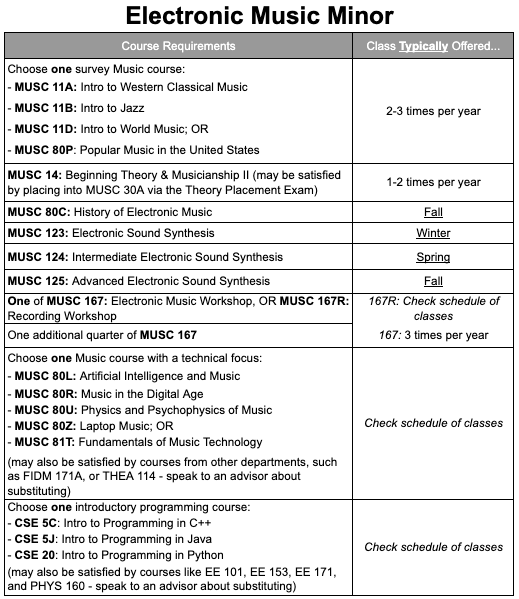After reading information about the Electronic Music minor, scroll down to find the MUSC 123/Electronic Music Minor application link.
The electronic music minor focuses on the study of creating music with the tools of modern technology. It is designed to complement the music major or programs in other media by providing instruction in advanced skills of audio production, sound synthesis, composition, and computer-assisted composition.
APPLICATION TO THE ELECTRONIC MINOR PROGRAM:
- Application and acceptance to the electronic minor program is required to enroll in the following studio courses: MUSC 123, 124, 125, and 167.
- Online enrollment is not open to students who have not applied and been accepted to the electronic minor program by taking the steps below.
-
Students wishing to apply to the minor must have completed (or be currently enrolled in) either of MUSC 123's prerequisites: Music 80C: History of Electronic Music (offered only in Fall), or MUSC 30A: Theory, Literature, and Musicianship (offered in Fall and Spring).
-
MUSC 80Z - Laptop Music OR CMPM150: Creating Digital Audio are both very helpful to students wishing to prepare for MUSC 123 but these courses are not required for application, nor for completion of the Electronic Music Minor.
-
- Application period opens in late-October/early-November. The deadline for the Winter 23 application is December 4th (the Sunday Fall Finals week). See above and below for online application link.
- Applications will be reviewed during the Winter break and 25 students will be accepted to the program each year. Students will be notified via email on their acceptance and given a permission code to enroll online in MUSC 123 for Winter.
- Applications are prioritized by students' apparent technical and musical qualifications. Student applicants must have sufficient quarters left in residency to complete the program. Applicants that are not accepted can re-apply the following Fall.
- So long as they submit the MUSC 123 application, declared and proposed Music majors are prioritized amongst applicants for spots in MUSC 123.
MUSC 123 Winter 2024 APPLICATION
*You must be logged into your UCSC email through Gmail in order to access the form. Go to the regular Gmail log-in. Enter your full UCSC email address (example@ucsc.edu) in the user name field, then enter your Blue password. From there, you can click on the link and have access.
APPLICATION DEADLINE: 11:59pm PST on DECEMBER 3rd, 2023.
The required courses needed for the Minor are:
1. One of MUSC 11A: Intro to Western Classical Music, MUSC 11B: Intro to Jazz, MUSC 11D: Intro to World Music, or MUSC 80P: Popular Music in the United States;
2. MUSC14. Students with little or no Music Theory experience can also take MUSC 13 before MUSC 14. Students should consider taking the Theory Placement Exam, offered twice every year (see the Theory Placement Exam page for further details). If students are placed into MUSC 30A via the placement exam, their theory requirement for the Electronic Music Minor is considered fulfilled;
3. MUSC 80C;
4. All of MUSC 123, 124, and 125;
5. MUSC167 (two quarters required). Students may take MUSC 167R to fulfill one quarter of this requirement;
6. One of MUSC 80L: Artificial Intelligence and Music, MUSC 80R: Music in the Digital Age, MUSC 80U: Physics and Psychoacoustics of Music (also PHYS 80U), MUSC 80Z: Laptop Music, or MUSC 81T: Fundamentals of Music Technology - or a similar music course with a technical focus as approved by the department (such as FIDM 171A: Special Topics Workshop, or THEA 114: Design Studio: Sound);
7. One introductory computer programming course such as CSE 5C: Intro to Programming in C++ (formerly CMPS 5C), CSE 5J: Intro to Programming in Java (formerly CMPS 5J), or CSE 20: Intro to Programming in Python (formerly CMPS 5P); or EE 70: Intro to Electronic Circuits, EE 153: Digital Signal Processing, or EE: 171: Analog Electronics.
Note: This minor can be taken in conjunction with certain programs in the music major (Music BA: Western Art Music concentration, Music BM). However, the upper-division courses you apply towards the requirements of your minor cannot usually be applied to your major.
| Attachment | Size |
|---|---|
| 67.28 KB |


